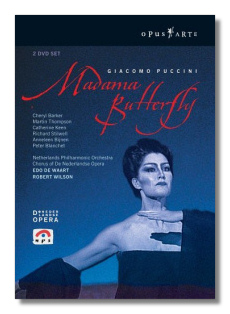
The Internet's Premier Classical Music Source
Related Links
- Puccini Reviews
- Latest Reviews
- More Reviews
-
By Composer
-
Collections
DVD & Blu-ray
Books
Concert Reviews
Articles/Interviews
Software
Audio
Search Amazon
Recommended Links
Site News
 DVD Review
DVD Review
Giacomo Puccini

Madama Butterfly
- Cheryl Barker (Cio-Cio San)
- Martin Thompson (Pinkerton)
- Catherine Keen (Suzuki)
- Richard Stilwell (Sharpless)
- Peter Blanchet (Goro)
- Anneleen Bijnen (Kate Pinkerton)
Chorus of de Nederlandse Opera
Netherlands Philharmonic Orchestra/Edo de Waart
Recorded Live at the Het Muziektheater, Amsterdam, 2003
Opus Arte DVD OA0937D 2DVDs 169min LPCM Stereo Dolby Digital DTS Anamorphic Widescreen
This very unusual production from 2003 was directed and designed by Robert Wilson, who probably is most famous for his collaborations with Philip Glass, including Einstein on the Beach and the CIVIL warS. Wilson would be on hardly anybody's top ten list of directors to direct a Madama Butterfly. In fact, in an introductory interview with Wilson, he claims to have disliked the opera when he first was exposed to it, and one senses that he can just tolerate Puccini's music. In this production from the Netherlands Opera, it was his intention to strip away everything that was superficial and phonily Japanese, leaving the viewer/listener undistracted by mere ornamentation. The result is an almost frighteningly austere Butterfly with no sets or props to speak of, no spectacle, no fussy costumes, and precious little action, at least in the traditional sense, apart from stylized movements and poses. There's not a blossom to be seen during the Flower Duet, and not even a dagger in the final scene – Butterfly seems to kill herself by willpower alone. What Wilson does give us is an exquisite sensitivity to body language – watch the singers' hands in this production! – and an astonishingly broad and precise palette of light and color. The lighting design in this production is more intricate than in any opera I've ever seen, and yet it serves a dramatic purpose.
Obviously this is not a Butterfly for everyone. Nevertheless, Wilson's asceticism does nothing to lessen the opera's power. In fact, this production is all the more moving for focusing our attention on the opera's tough core, not on costumes or on cute or silly little bits of stage business, and certainly not on sentimentality. Even when Wilson has his characters move contrary to the direction of the music, somehow it works.
Were it not for the excellence of the cast and conductor Edo de Waart, it might not have worked. Apparently de Waart had never conducted this score before, but after a somewhat stiff beginning, wonderful things happen in the orchestral pit in terms of color, detail, and pacing. In the title role, Cheryl Barker never really seems girlish – Wilson's idea, I would imagine – so there's not a marked growth in her character between the first two acts. Still, her characterization is a complete one, and she is no less effective in the score's intimate moments than when she is declaring her love for Pinkerton or bidding a last farewell to her child. Hers is big and yet flexible voice and she is up to the role's frightening challenges, with no audible fatigue at the end. Whether or not she agrees with Wilson's concept, her every gesture, movement, and expression is spellbinding. Martin Thompson's Pinkerton is more of a cipher. (Both he and Sharpless are dressed formally but plainly, in what might be described as a Japanese minimalist's idea of how Americans dress.) Vocally, he does everything right and sings handsomely, but without much nuance. By the time he gets to "Addio, fiorito asil," he is starting to sound a little rough around the edges, but that might simply be his response to the situation on stage. On the other hand, Catherine Keen is a Suzuki you really remember, with her rich voice and sympathetic stage presence, and Richard Stilwell's Sharpless is the voice of benevolent authority. Kudos also go to Peter Blanchet for his malevolent and lizard-like Goro. According to the libretto, Butterfly's child should be two going on three, but in this production, he appears to be more than twice that age, and his dark, straight hair gives the lie to the libretto's "golden curls." (Perhaps they are golden curls only in his mother's imagination?) Young Marnix van der Moezel, clad only in a white loincloth throughout, gives an uncanny performance here, particularly in the Humming Chorus and in the introduction to Act Three. These are done as a continuous pantomime for the child, and while I don't understand everything about it (what is he picking up from the ground and eating? What is he eating from his mother's hand?), it is performed with amazing concentration and poise by this young actor.
The aforementioned introduction to the opera is 24 minutes in length, and also includes interviews with de Waart, Barker, and Thompson. There's also an illustrated synopsis. Act One is on the first DVD, and the remainder of the work (Acts Two and Three are conflated) is on the second DVD. The sound (stereo or DTS digital surround) is superb, as is the picture (Anamorphic Widescreen). The English subtitling is intelligently done.
It is hard to recommend this as anyone's first or only Butterfly, but it is impossible not to recommend it to anyone who knows and loves this opera. Many may dislike what Wilson has done with Butterfly, but his high-concept production is thought-provoking, intelligent, and devoid of sensationalism – an excellent "new look" at a beloved old opera.
Copyright © 2006, Raymond Tuttle




















